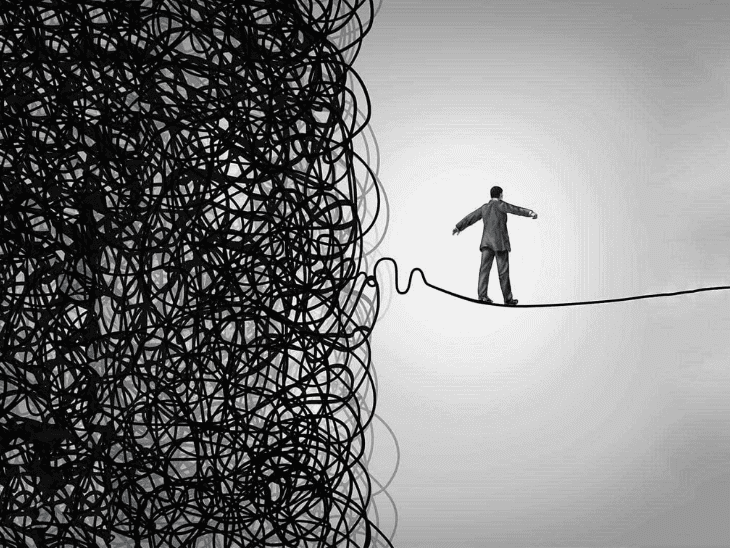Mental wellness should be a right. Since psychotherapy is often expensive and someone may lack the courage or the financial resources to seek professional help, there are other ways to increase your knowledge and get those tools and information that psychotherapists may provide in therapy. One of them is for sure following Nawal Mustafa. After obtaining a B.Sc in behavior, cognition, and neuroscience, Nawal did something that many millennials do: she took a sabbatical. Eventually, the year off helped her understand the subject of her passion was clinical neuropsychology. Now, she’s a Ph.D. student. In her spare time, though, Nawal does something even better than studying and researching: she shares knowledge. With a successful Instagram account, @thebraincoach, Nawal provides insightful snippets easy to understand to anyone who is looking for improving their mental health. Often put on do’s and don’t’s list way, here are the best tools and tips Nawal shared (spread) with her followers!

1. Helpful ways to communicate resentment
Resentment may be quite a break-dealer in a long term relationship. It accumulates and often become ager or worse. If you’re in pain or you still feel bad about previous interactions with someone it is difficult to empathize with him. Unhealed wounds can result in a toxic environment. To overcome these negative feelings firstly we must have a common intention to talk about the issue, taking turns to communicate with each other. Here some examples of how to turn a resentful statement into a helpful one. 1) Why don’t you ever listen? —> I feel unheard 2) You don’t care about me! —> I feel unloved 3) You are so insensitive —> I feel disrespected

2. How to communicate anger
Yell, swear, stonewall are all easy reactions when we get upset. Responding and communicating our feelings, instead, takes a good level of self-awareness and courage. When it comes to anger, however, its expression can lead both to healthier and more productive communication or to more frustration. If playing the victim, don’t face up to your own responsibilities, don’t listen to the other’s person’s perspective or overwhelming him bringing up the past are unhelpful ways to communicate anger, here follow the helpful ones. Always remember to pause before responding, to use “I” statements, to own up to mistakes and, last but not least, to stick to one topic.

3. Passive Mindset v. Active Mindset
We all deserve a better future, it’s just that building it depends mainly on our mindset. With a positive mindset, we’re all capable of being better, but first, we have to realize that we’re accountable for our own habits and behaviors that work against to that end. So don’t think about your past as something that has left you unable to move forward, instead believe in your ability to heal and be better. Don’t say that you can’t follow through with your own goals, instead set realistic ones for yourself and work on them daily. Make time for things you want to do in order to improve your life, don’t say you don’t have it. Be always conscious of how you spend your time: don’t blame your boring routine, instead of challenging yourself with new things.

4. Helpful ways to communicate boundaries with family
Unfortunately, in every family boundaries are often breached. Taking care of us and supporting us financially is something that makes us feel in debt to our parents. This dynamic makes it even harder to set personal limits on how they treat us or what they expect from us. Knowing this, there are helpful and efficient ways to communicate boundaries: they don’t include passive-aggressive comments, personal attacks, or rude tone, which usually just escalate more conflict. An example? “Don’t tell me how to live my life. You don’t know what you’re talking about” can easily turn into “I appreciate your concern about my life, but I’m doing okay. Is it alright if I ask you for advice when I need it next time?”.

5. Codependent Relationship v. Independent Relationship
We all know that what we carry in our adult relationship is mostly based on our parent’s relationship when we were children. For their flows we subconsciously blame ourselves, feeling unworthy or incapable. The good news is that the behaviors we adopted to seek our parent’s love and support don’t serve us anymore as adults. We shouldn’t settle for a codependent relationship, where we feel guilty for declining a request or emotionally manipulate the partner making them feel guilty if they don’t agree with us. Trying to control your partner or having no personal interests outside the relationship is wrong. The most successful relationships are the independent ones, where you don’t overextend yourself in it and respect your partner’s choices and opinions. In the end, for a better couple life, you have to make time for your own personal self-care and give each other enough space to maintain a sense of self.

6.Passive Communication v. Assertive Communication
“It really doesn’t matter. It’s fine”. How many times have we heard or said this sentence? This is a classic example of passive communication, where we put our eagerness to please, and being agreeable before our needs. Wouldn’t be better to be assertive and say something like “I don’t think that was fine because I felt hurt by your behavior”? Communicating assertively allows us to be truly understood and prevents us from suffocating who we are. Keeping feelings inside can be stressful, it’s healthier to be direct, calm, respectful, and assertive. Please, note that assertive doesn’t mean aggressive: we don’t have to be loud in order to be heard.

7. Healthy Venting v. Emotional Dumping
Being able to distinguish “healthy venting” from “emotional dumping” can improve our mental health. When we’re frustrated we need to communicate how we feel but – as always – there is a healthy way of doing it and an unhealthy one. Especially if you’re an empath, you will feel drained after both receiving or delivering emotional dumping. How to identify an emotional dumper? If he blames others, repeating the same issue over and over, not willing to find a solution, if he is always defensive even to constructive feedback and he doesn’t respect the other’s perspective or time, you got one. Wouldn’t it be better not to be so toxic? Be open to solutions, to constructive feedback, and to other’s perspectives? Wouldn’t it be easier to stick to the topic and don’t blame others? Yes, it would. Anyway, if you’re facing emotional dumping, please remember that it’s okay to politely ask to postpone the debate to when you’ll be both calmer and to create boundaries.

8. Helpful ways to redirect fear-based thoughts
What if…what if…what if… How many times you have “what if” thought during the day? And, answer honestly, how many times fear is the source of these thoughts? It’s okay if both questions got the answer “always”, as long as you know that this is just a learned cognitive style. And, as you learned it, it also can be unlearned. Approaching uncertainty always with “fear” rather than “hope” can be a problem in the long run. Try doing this exercise instead: redirect these fear-based thoughts to more positive ones. “This is too risky. What if I fail?”. Easy, you won’t know until you try. What if you succeed?

9. We can control v. We cannot control
One easy way to be unhappy (we can even call it the perfect recipe for disaster) is refusing to accept situations/things we can’t change. We have no control over everything, the only thing that will ever have in control is our response. Once we understand this, we begin to heal. We can’t change our past, but we certainly can start forgiving ourselves. We can’t force someone else to love us or take care of us, it’s only our responsibility to do so. You can’t please everyone, you have to speak up for your needs. You can’t control what happens around you, so learn to let go of resentment. In the end, don’t force someone to change, change instead your response or action.

10. Assessing your need during a burnout
How to describe and recognize a burnout? Let’s say it’s extreme stress or fatigue that affects our well-being, mentally and emotionally, even touching our work ethic. When experienced in the workplace, it leaves you discouraged, with no enthusiasm for the work you’re doing. As a matter of fact, “workplace burnout” is now officially a mental disease recognized by the WHO (World Health Organization). How can we assess our need while having a burnout? First of all, learn to say “no” politely instead of overextending yourself. Re-establish a routine if you feel lost. Practice positive thinking and reorganize your goals by importance: little but specific subgoals can lead you to complete major goals that would otherwise be procrastinated.

11. Immature defenses v. Mature defenses
Threatening people and uncomfortable reality produce distress, but how can we protect ourselves from this anxiety? It depends. As theorized by Dr. George Vaillant, we can adopt a mature or immature defense mechanism. It’s not mature to act out, like injuring yourself or punch a hole through a wall, as it’s not mature passive-aggressive communications or fantasizing in order to escape reality. Another kind of immature defense mechanism is somatization. On the contrary, it’s mature to react with humor or identification (like when we start a new job and we adopt the social norms among colleagues to seek acceptance). It’s also efficient and mature to anticipate stress-inducing events, which can actually alleviate anxiety. Do you use any of these mature defenses?

12. Managing a massive setback
Experiencing a massive setback can lead to anxiety or low self-esteem. The important it’s not to be caught in a negative thinking pattern and always question our distorted thoughts. Thinking errors can change the way we act upon a situation: For instance: instead of thinking that you’re not cut out for what you’re doing, you should remember that failing at something doesn’t define your worth or competency. This will help you feel more hopeful and confident instead of discouraged and incompetent so that you won’t end shutting down or giving up but pushing yourself to try harder instead.
